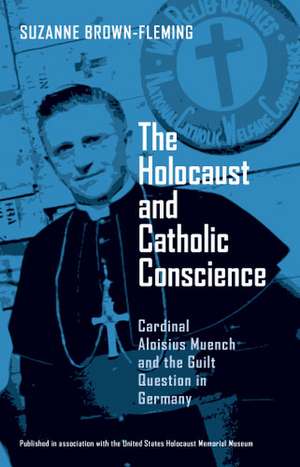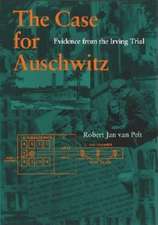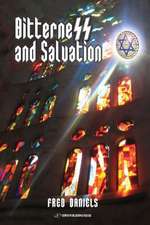The Holocaust and Catholic Conscience – Cardinal Aloisius Muench and the Guilt Question in Germany
Autor Suzanne Brown–flemingen Limba Engleză Paperback – 15 feb 1994
| Toate formatele și edițiile | Preț | Express |
|---|---|---|
| Paperback (1) | 209.53 lei 6-8 săpt. | |
| MR – University of Notre Dame Press – 15 feb 1994 | 209.53 lei 6-8 săpt. | |
| Hardback (1) | 589.40 lei 6-8 săpt. | |
| MR – University of Notre Dame Press – 15 feb 1994 | 589.40 lei 6-8 săpt. |
Preț: 209.53 lei
Nou
Puncte Express: 314
Preț estimativ în valută:
40.09€ • 43.69$ • 33.78£
40.09€ • 43.69$ • 33.78£
Carte tipărită la comandă
Livrare economică 23 aprilie-07 mai
Preluare comenzi: 021 569.72.76
Specificații
ISBN-13: 9780268021870
ISBN-10: 0268021872
Pagini: 256
Dimensiuni: 152 x 229 x 18 mm
Greutate: 0.4 kg
Ediția:1
Editura: MR – University of Notre Dame Press
ISBN-10: 0268021872
Pagini: 256
Dimensiuni: 152 x 229 x 18 mm
Greutate: 0.4 kg
Ediția:1
Editura: MR – University of Notre Dame Press
Recenzii
“The import of this book is not only its critical historical analysis of the legitimizing, self-preserving, and anti-Semitic 'conscience' of the Roman Catholic Church in the immediate aftermath of World War II and the increasing world-wide awareness of the Holocaust horror. Through a critical reading of the text, it also forewarns of an all too similar contemporary trend developing now on a global scale in the form of the U.S.-led neo-conservative notion of a 'clash of civilizations.'”
“Brown-Flemming's work deepens our understanding of how Catholics coped in the postwar period, as anti-Semitism not only lingered, but also continued to shape Catholic responses to the past.”
"Suzanne Brown-Fleming's short study of the post-1945 career in Germany of Bishop, later Cardinal, Aloisius Muench seeks to rectify some shortcomings she finds in F. Colman Barry's biography written in the 1960s. . . In her view, Muench, as the Vatican's leading representative in Germany from 1946 to 1959, contributed to the lack of self-examination and the perpetuation of anti-Semitic prejudices among German Catholics. In this way, he was emblematic of the Catholic Church's failure in this period to confront its own complicity in Nazism's anti-Jewish ideology."
“In a concise and clearly written book that will surely arouse polarizing responses, [Brown-Flemming] argues that the American-born Aloisius Muench helped shape the Catholic Church's rejection of guilt for the persecution of Jews under the Nazis. . . . She convincingly shows that Muench worked much more rigorously on behalf of the defeated Germans than for their victims.”
Notă biografică
Suzanne Brown-Fleming is Senior Program Officer in the University Programs Division of the United States Holocaust Memorial Museum’s Center for Advanced Holocaust Studies in Washington, D.C.
Descriere
"In this revealing study, Suzanne Brown-Fleming takes us back to a post–World War II Catholic world that had yet to come to terms with either Nazism or the Holocaust. One of the leading Catholic clerics in postwar Europe, Cardinal Aloisius Muench both reflected and helped promote German Catholic failures in this regard. Anchored in Cardinal Muench's private papers, this book conducts a fair-minded, but rigorous and morally animated assessment of a Catholic conscience that was later transformed by Vatican II. I recommend it highly." —Michael R. Marrus, Chancellor Rose and Ray Wolfe Professor of Holocaust Studies, University of Toronto
"This is an excellent book that will be of great interest to all historians in the fields of church history, Christian-Jewish relations, and American Catholicism." —Susannah Heschel, Dartmouth College
"This clearly written book deals with the problems nations face in dealing with their past—in this case, the Holocaust. Germany has faced this dilemma—to accept or shrug off shame—for many generations, but the immediate postwar years tormented them more than any, and more than any other nation has had to face. To a great extent Bishop Muench provided the salve for the Germans' scorched consciences. But Muench, a first-generation German-American, carried his own antisemitic baggage, and answered to a pope who responded weakly to the Holocaust and who afterwards absolved German Catholics as a body from guilt. The reader will feel the anguish of history in these pages." —Michael Phayer, Marquette University
American-born Cardinal Aloisius Muench (1889–1962) was a key figure in German and German-American Catholic responses to the Holocaust, Jews, and Judaism between 1946 and 1959. He was arguably the most powerful American Catholic figure and an influential Vatican representative in occupied Germany and in West Germany after the war. In this carefully researched book, which draws on Muench’s collected papers, Suzanne Brown-Fleming offers the first assessment of Muench’s legacy and provides a rare glimpse into his commentary on Nazism, the Holocaust, and surviving Jews. She argues that Muench helped legitimize the Catholic Church’s failure during the 1940s and 1950s to confront the nature of its own complicity in Nazism’s anti-Jewish ideology. This fascinating story of Muench’s role in German Catholic consideration—and ultimate rejection—of guilt and responsibility for Nazism in general, and the persecution of European Jews in particular, is an important addition to scholarship on the Holocaust and to church history.









